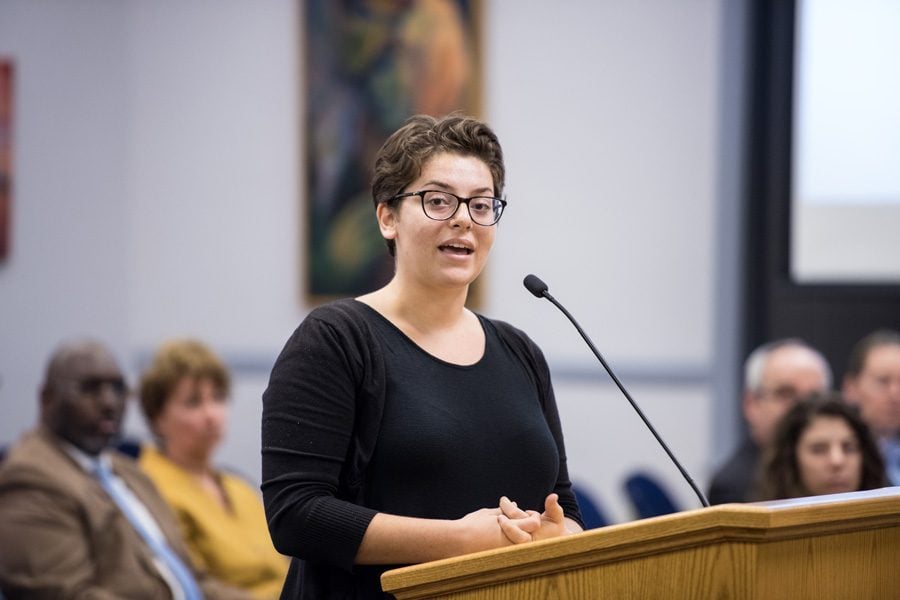Students, faculty discuss social inequalities and diversity course requirement at community dialogue
Colin Boyle/The Daily Northwestern
ASG President Christina Cilento addresses the mayor, aldermen and city staff at City Council in October. Cilento attended a community dialogue on campus Wednesday and said the event aimed to help further diversity and inclusion within classrooms and in student-faculty relationships.
December 2, 2016
Students and faculty voiced a need for immediate action to ensure inclusiveness in classrooms by pushing forward a social inequalities and diversity course requirement at a community dialogue on Wednesday.
“I believe that the discussion on race and class in America is the single most important thing we could be talking about,” said religious studies Prof. Laurie Zoloth, president of Faculty Senate. “There is no other thing that should (capture) our attention as citizens at this moment in time, this moment in history.”
During the quarterly community dialogue, faculty and students gathered to discuss the diversity course requirement, faculty training and course affordability. Associated Student Government President Christina Cilento, a SESP senior, said the purpose of the discussion was to help further diversity and inclusion within classrooms and in student-faculty relationships.
When asked when the Weinberg College of Arts and Sciences would implement a social inequalities and diversity course requirement, Weinberg Dean Adrian Randolph said a committee handling the issue will reach out to different departments this winter to look over proposed courses. Once reviewed, a proposal will go on to a faculty vote, he said.
“It may take some time to weigh in,” Randolph said. “But I think we’re heading toward at least having a robust discussion.”
The current proposal is to have two requirements — one focused on the United States and another on global social inequality, said Mary Finn, associate dean for undergraduate academic affairs.
McCormick senior Steffany Bahamon said the McCormick School of Engineering should also implement such requirements. She said many of her peers still have a lack of understanding of inequality in the United States.
Wesley Burghardt, associate dean of undergraduate engineering, said the school is currently in a “holding pattern” because the context and mode of teaching being sought by the proposal is outside the realm of most of the faculty’s expertise. Once Weinberg finishes its evaluation of the requirements, McCormick may take similar measures, Burghardt said.
“We’ve been running a few experiments outside the edges,” he said. “We’re interested in seeing if there is sort of an engineering-specific slant that can be put on this, but it’s very hard to take that kind of idea and scale it up on a school-line basis.”
Randolph also responded to students complaints about the delay in implementing the social inequalities and diversity courses. Discussions about how to put the course requirement into effect have been ongoing since February 2013, when Northwestern’s University Diversity Council completed a proposal asking NU to require a university-wide diversity requirement for undergraduate students.
Randolph said the school wants to make sure it is “going to do it right.” In an interview with The Daily on Wednesday, he said he wanted to ensure the course requirement would not weigh too heavily on certain departments and may require additional faculty hirings.
The dean also warned students about having idealistic hopes about the proposals.
“It’s exciting, and I think we’re headed in the right direction, but I think we ought to be careful not to promise to future students that somehow we’ll have this,” Randolph said.
Students also brought up the need to train faculty to discuss diversity more often in their classrooms as well as on proper pronoun usage and the differences between the terms “black” and “African American.” In discussing faculty’s attentiveness to their students, Weinberg senior Jourdan Dorrell, ASG’s vice president for diversity and inclusion, said it has sometimes felt as though concerns about her education were devalued by her professors.
“There’s something special about college because … you have the flexibility to pursue something you’re really interested in and really craft the way you think,” Dorrell said. “Being able to do that has been such a great experience of mine here, but I’ve definitely had experiences where I felt silenced, and I couldn’t get the learning experience I’d hoped and desired, partially due to the academic professor.”
To open up more dialogue with students, philosophy Prof. Baron Reed encouraged more departments to establish climate committees, which students can submit complaints to anonymously. SESP Prof. Regina Logan also told attendees about Change Makers, a workshop for faculty and staff that is “dedicated to building a more inclusive campus environment.”
Email: [email protected]
Twitter: @ck_525












